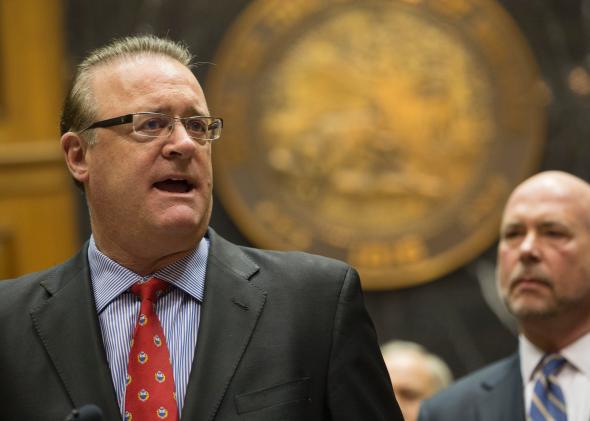The Huffington Post banner headline read “Indiana Gives In.” Freedom Indiana proclaimed “Victory” in a celebratory graphic posted on Facebook. Politicians and other media outlets will surely soon declare that the two-week-old controversy in Indiana, pitting religious freedom against anti-gay discrimination, is now over—and that gay rights have won.
The “fix” announced this morning is definitely a step in the right direction. Hard-working grassroots activists like the folks at Freedom Indiana ought to be heartened by the fact that their state legislature heeded the objections of citizens who were outraged by the way the law seemed to actually encourage discrimination. It’s a relief—but is it a “victory”? That all depends on how you define victory, since the “fix” actually returns Indiana to the status quo that existed before the religious freedom bill became law—a status quo that allowed anti-gay discrimination throughout most of the state.
According to the proposed language released by Indiana Republicans this morning, the “fix” is that the religious freedom law cannot be used as a defense to a discrimination claim. In other words, if a gay person were to sue for discrimination, an employer, business owner, school, or landlord could not point to the new law as an attempted justification for their actions. The problem is that almost everywhere in Indiana that gay person could never have sued in the first place.
Calling today’s proposed “fix” a big victory may actually have the effect of perpetuating a fundamental misunderstanding of anti-discrimination law. People like to think that discrimination is “not allowed” in America. Employers can’t discriminate in hiring and firing; businesses have to serve people without being discriminatory; schools can’t discriminate in grades and disciplining students; and landlords can’t be discriminatory in renting property. Discrimination, people believe, is un-American and forbidden by the Constitution, particularly by the equal protection clause.
However, discrimination is perfectly lawful in most circumstances. The Constitution protects us from only certain types of discrimination and only at the hands of the government itself. The baseline of American law is actually that private employers can pick and choose the people they want to hire and fire based on good, bad, or irrelevant reasons, including discriminatory ones. Businesses can do the same when deciding which people to serve; schools and landlords with the people they educate or rent to.
In order for a state or the federal government to carve out exceptions to this general rule, that government has to pass a law that does so. Federal law, for example, removes race, religion, national origin, and sex from being the basis for employment decisions for all employers over a particular size. Other federal and state laws do the same in other walks of life.
But unlike these other categories, sexual orientation is not universally carved out as an unlawful form of discrimination. The federal government, for instance, has not included sexual orientation in its list of types of prohibited discrimination. That’s why state anti-discrimination laws are a big deal for gay people, and why it’s so dangerous for gay and lesbian people that only a minority of states have included sexual orientation discrimination in their laws.
Indiana is not on that list. Thus, before the religious freedom bill was signed into law, in most of Indiana (a small number of cities have changed their local laws), discrimination based on sexual orientation and gender identity was perfectly legal. All the Indiana RFRA would really have done to further injure gay Hoosiers would have been to provide a way for people wishing to discriminate against gays to avoid the few local laws that prohibit that behavior.
In case you were wondering, this situation didn’t change with the introduction of same-sex marriage in Indiana. As in other states, in Indiana, a gay couple can now get legally married on Sunday and then one of them can just as legally be fired on Monday for putting a picture of his husband on his desk. That was true before the religious freedom law was passed, and it will still be true if this “fix” is enacted.
Which is why today’s announcement, though clearly a step back from an even worse position, is only a partial victory at best. Today, unfortunately, Indiana is not proposing amending its general anti-discrimination laws to prohibit anti-gay discrimination. Without doing so, except in a few cities that have their own laws, Indiana employers can still fire gay people for being gay, Indiana businesses can still refuse service to gay couples because they don’t approve of gay people or gay marriage, Indiana schools can still treat gay students differently, and Indiana landlords can still deny apartments to gay people.
As one of us quipped to the other this morning after news of the “fix” broke, “Now we can just get regular discriminated against like we always do!” We guess that’s something of a victory, but you won’t find us celebrating until Indiana does what the rest of the country needs to do—affirmatively protect against sexual orientation and gender identity discrimination throughout its law.
Read more of Slate’s coverage of the Indiana Religious Freedom Restoration Act.
